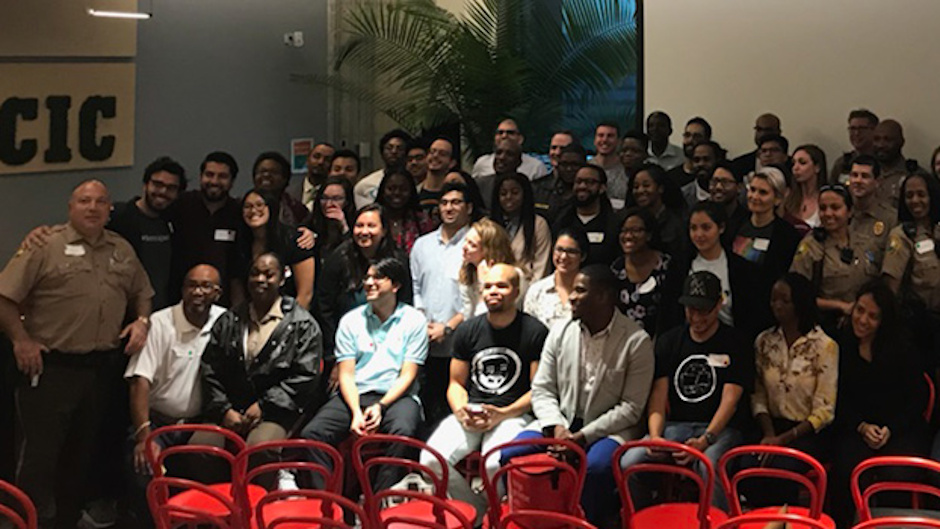Held at UM’s Life Sciences and Technology Park, the event was organized by Miami Law alumni Feras Ahmed, J.D. ‘17, and Leigh-Ann Buchanan, J.D. ‘09, as part of the American Bar Association’s Coalition on Racial & Ethnic Justice, to which Ahmed is an advisor.
JusticeHack 2.0 was also co-sponsored by Miami Law's Business of Innovation, Technology, and the Law concentration (BILT), the LawWithoutWalls Program, and the HOPE Public Interest Resource Center.
“ABA JusticeHack Miami was an attempt at bringing together stakeholders with different skills and backgrounds that ordinarily may not work together and challenging them to work together as a team to address tension points in our community,” Ahmed said.
The hackathon saw close to a dozen diverse teams working together, each comprised of students, entrepreneurs, programmers, and law enforcement officers.
Miami Law alumni Rachel Streitfeld, J.D. ‘16, and Carlos Martinez, J.D. ’90, were part of the first-place-winning team which developed Freeze, a virtual reality gaming app which simulates a police officer’s interaction with a civilian. The team won a $500 prize for first place.
“We turned to a conversation about building trust and empathy, and decided to use virtual reality and gaming to help a targeted population, young people, to understand what it is like for an officer,” Streitfeld said. “The user comes to understand how the officer is trained, so that in the future, in a real-life scenario, they have empathy.”
Streitfeld currently serves as the Vice President of the ACLU of Greater Miami. She also works as an attorney at the law firm Shubin & Bass.
“My experience at UM Law is directly tied in every single way to today,” she said. Streitfeld was introduced to the ACLU through the chapter at UM Law, and she took part in LawWithoutWalls, which, like JusticHack, emphasizes critical thinking, collaboration, and technology in addressing real issues.
Carlos Martinez, who serves as the elected Public Defender for Miami-Dade County, also worked on the Freeze team. He feels strongly that the app can have a positive impact on communities and is eager to take it beyond the concept stage, by getting in touch with developers to try to make Freeze a reality. “I think it would serve an important purpose in educating, and also creating more empathy,” he said.
In looking at the issue as a whole, Martinez emphasized the importance of addressing the problem of racial bias, which exacerbates tensions between law enforcement and communities: “If there is any way that we can increase how we look at each other, how we see each other, that is beyond what we’re watching on television, I think that will help us bridge the gap, bridge communications, and get us to see each other for what we are,” he said. “And I thought it was an amazing idea to look at that challenge from the technology perspective.”
This year’s JusticeHack Miami was the second iteration of the event; the hackathon in 2017 also saw UM alumni produce prize-winning innovations.
Ahmed is excited about the potential for technology to change communities for the better, and emphasizes the necessity of collaboration in achieving that end.
“Tech and social good are not mutually exclusive. We are stronger when we all work together.”

